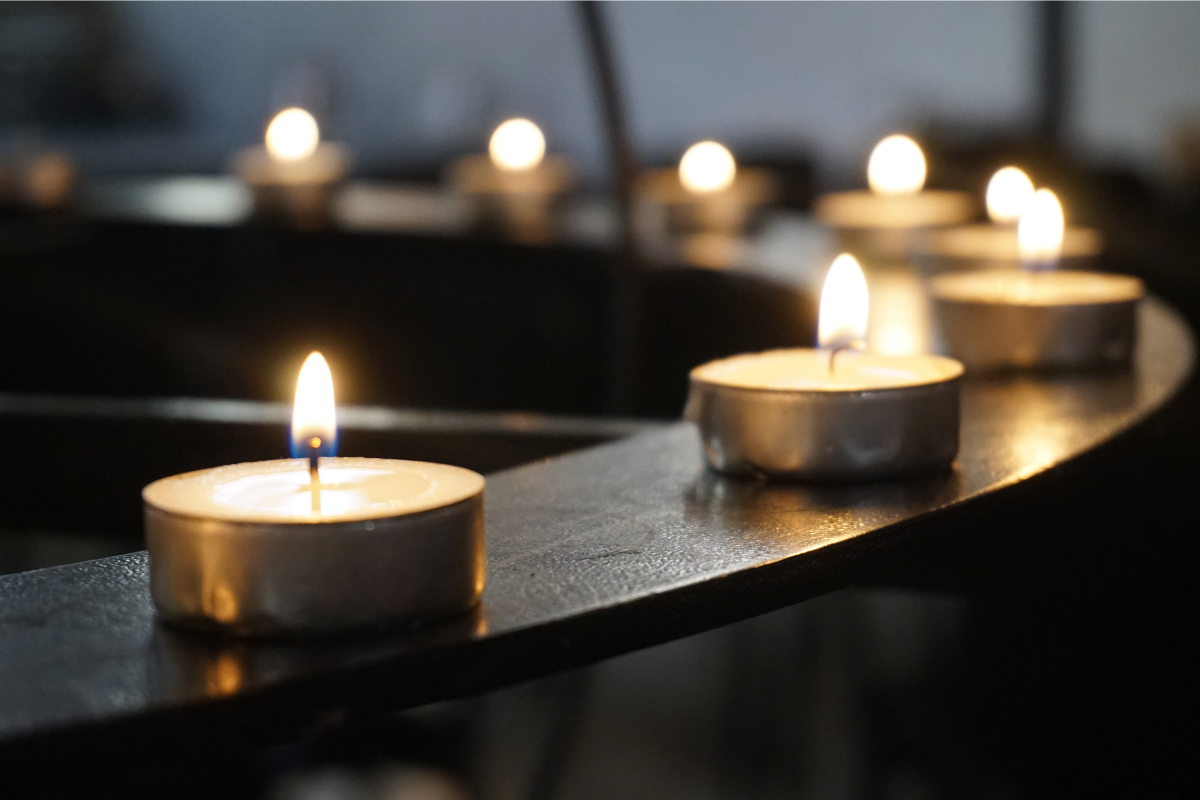Post Disclaimer: This blog reflects the author's personal experience with end-of-life matters and is provided in good faith for informational purposes only. While we aim to provide clear guidance on hard-to-find topics, this content is not legal advice and your use is at your own risk. Estate planning and end-of-life laws vary by location, so please consult your state's laws and seek guidance from a licensed attorney for your specific situation. We make no warranty about the accuracy or completeness of this information, which does not replace professional legal counsel. For more information, please see our full disclaimer.
Losing a loved one is undeniably one of life's most difficult moments, leaving both emotional and logistical challenges in its wake.
Planning a funeral during such a time can feel overwhelming, as it involves navigating through a maze of decisions while honoring the deceased's wishes and respecting cultural traditions.
It's essential to balance personal beliefs with practical needs, ensuring you're giving your loved one the respectful farewell they deserve.
This guide will offer compassionate guidance on how to plan a funeral, providing strategies to help ease this burden.
By addressing both emotional and logistical aspects, we aim to make this process as manageable as possible, offering a supportive framework at a challenging time.
For immediate steps and considerations, you may find our checklist for when a death occurs helpful.

Types of Services
Understanding the various service options available when planning a funeral can help you make arrangements that are both respectful and reflective of your loved one’s life.
Whether you are considering a traditional funeral, a memorial service, or another type of ceremony, knowing these choices can guide your decisions and ease the process.
Funeral Service
When planning a funeral, there are several service options to consider:
- Traditional Funerals: These often include a viewing or visitation, a formal funeral service, and the burial of the deceased. This type of service may take place over two or three days, allowing for a more extended period of mourning and support for the bereaved.
- Graveside Services: These are shorter ceremonies held at the gravesite before the burial. They offer a more intimate setting and can be combined with or take the place of a traditional funeral service. This type of service might be suitable for those who value simplicity or wish to emphasize the burial itself.
- Religious or Faith-based Ceremonies: Many choose to follow the rituals and customs of their faith, from Christian or Jewish funerals to Muslim or Hindu rites. These ceremonies provide comfort and structure through prescribed traditions, serving as a tribute to the deceased’s spiritual life.
You can further explore different types of funeral services for more tailored options that can cater to specific family traditions or personal preferences.
Memorial Service
In contrast to a funeral, a memorial service typically occurs after the body has been buried or cremated.
- Flexible Timing and Location: Memorial services offer considerable flexibility. They can be scheduled weeks or months after the passing, allowing time for family and friends to gather, especially if they are traveling from afar. Locations vary from churches and synagogues to parks or even homes, depending on the desired atmosphere.
- Personalization Options: This type of service can be uniquely tailored to reflect the personality and achievements of the deceased. From playing their favorite music to sharing fond memories or displaying cherished memorabilia, the potential for personalization is vast. The structure of a memorial service supports the creation of a fitting tribute to the life lived.
With roots in both commemorating and celebrating the deceased's life, memorial services often resonate with families seeking a heartfelt and personalized gathering.
Additional information on these services is available through trusted resources to assist you in making informed choices.
For more support and assistance on the procedural aspects after a loss, you might find the Death Notification Checklist helpful as well.

Planning a Funeral
Planning a funeral is a solemn task that often falls on the shoulders of those closest to the deceased.
It may feel like walking through an emotional storm, and the logistical details may seem daunting.
Yet, with careful preparation, you can create a meaningful ceremony that honors the life of your loved one and provides solace to those left behind.
Pre-Planning a Funeral
Pre-planning a funeral can significantly ease the burden on family members during an already stressful time.
It involves making arrangements in advance, allowing you to focus on grieving and remembrance without the added stress of decision-making.
Benefits of Pre-Planning:
- Financial Preparedness: You can lock in prices that help avoid inflationary increases.
- Respecting Wishes: Ensure the deceased's desires are clearly expressed and documented.
- Reduced Stress: Family members won't have to make hurried decisions under emotional strain.
Several services cater to this thoughtful approach. They offer packages ranging from basic plans to comprehensive arrangements, covering everything from funeral homes to reporting a death to the Social Security Administration.
By documenting your preferences, these services provide clarity and direction after a loved one's passing.
Planning a Funeral Service
An important aspect of planning a funeral is coordinating the service, which reflects the life and beliefs of the deceased.
It typically involves multiple decisions that range from practical considerations to more personal touches.
Key Elements to Consider:
- Selecting a Venue: This could be a religious place, funeral home, or even a peacefully chosen outdoor setting. Each venue offers different atmospheres and facilities.
- Choosing a Funeral Director: A reputable director can guide you through arrangements, handle paperwork, and coordinate with relevant services.
- Deciding on Ceremony Elements: Whether opting for hymns, personal tributes, or symbolic rituals, these choices personalize the service.
Sometimes, seeing how others have approached these choices can offer new ideas and insights.
By contemplating these details ahead of time, you create a framework that helps navigate the intricacies of planning while still holding the memory and dignity of your loved one in the forefront.
With each decision, from the broader layout to the finer personal touches, your aim is to craft a heartfelt tribute that reflects the character and values of your dearly departed.
For further guidance, consider exploring additional funeral planning resources that provide comprehensive lists and expert advice.

Financial Considerations
Navigating the financial aspects of planning a funeral can be a daunting task amidst a time of grief.
It’s essential to approach these considerations with clarity and understanding to ensure that you're honoring your loved one without imposing undue financial stress on yourself or your family.
A closer look at the average costs, funding options, and methods to manage expenses can guide you through this challenging journey.
Average Funeral Cost
The cost of a funeral can vary greatly, influenced by several components. Among the most significant are the funeral home’s basic services fee, which covers planning, permits, and coordination.
Then, there are charges for removing and preparing the remains, which contribute significantly to the overall expense.
The type of service, whether a traditional burial or cremation, also has a significant impact.
- Funeral Home Services: Fees can encompass everything from planning services to staffing during the service.
- Preparation of Body: This includes embalming and body preparation, such as dressing and cosmetology.
- Caskets and Urns: Choosing a casket or urn can range drastically in price, often influenced by material and design.
For a comprehensive breakdown of these costs, consider reviewing this detailed guide on funeral expenses.
Understanding these can help in planning a funeral that aligns with both your emotional and financial capabilities.
Paying for a Funeral
When finances are tight, there are alternatives to explore that may assist with funeral expenses.
Payment plans through the funeral home can make costs more manageable by spreading them over time.
In addition, several organizations and state programs can provide financial assistance.
- Payment Plans: Many funeral homes offer financing options for families.
- Insurance: Life insurance policies may cover funeral expenses.
- Government Benefits: Some states offer assistance or stipends to help with costs.
For those in need of financial aid, Funeralocity outlines various assistance programs available.
Exploring these resources can alleviate financial concerns while planning a funeral.
Managing Funeral Expenses
Budgeting for a funeral doesn’t undermine your loved one's memory—instead, it ensures the process doesn’t cause further hardship.
Start by setting a realistic budget and prioritize areas where costs can be managed or reduced without sacrificing the ceremony’s integrity.
- Comparative Shopping: Compare prices from multiple funeral homes to ensure competitive rates.
- Simplified Services: Consider opting for a direct burial or cremation which typically costs less.
- DIY Options: Creating your own reception or memory table can reduce costs while providing a personal touch.
For additional strategies on managing ceremonial costs effectively, take a look at these financial and budgeting tips.
Small adjustments in the planning process can significantly lower expenses while maintaining the dignity and respect your loved one deserves.
By understanding these financial considerations and exploring available options, you can navigate this challenging process with greater ease and assurance.
A thoughtful approach to funeral planning honors your loved one’s life while recognizing your family’s current and future financial well-being.

Additional Considerations
When planning a funeral, certain additional considerations can greatly impact the event's overall tenor and effectiveness in honoring your loved one.
These details, while not always at the forefront, are essential in crafting a respectful and personalized farewell.
Plan a Funeral Reception
A funeral reception offers an opportunity for friends and family to gather, remember, and support each other.
Choosing where and how to host a reception requires thoughtful consideration:
When it comes to venues, options range from community halls to more intimate settings like a family home or a favorite local eatery.
Each space offers unique advantages, whether it’s a large capacity for hosting many guests or a private ambiance for personal reflections.
As for catering, the focus should be on providing comfort and nourishment.
You could opt for simple fare such as sandwiches and fruits, as Cooked Goose Catering suggests, or perhaps something more substantial depending on the time of day and your budget.
Dignity Memorial offers insights into full-service options that can help alleviate some of the organizational stress.
Inviting guests and managing RSVPs might seem daunting, but modern tools can simplify this process—consider online invitations as a means to efficiently track responses.
Also, engaging a few family members or close friends to assist can make this process smoother.
By delegating tasks, you balance the workload and also provide others an opportunity to contribute.
Honoring Personal Wishes
It's crucial to honor the personal wishes of your loved one when planning their funeral.
This not only pays respect to their life but also provides comfort and closure to those in mourning.
Firstly, review any documented preferences, such as preset funeral plans or wishes articulated verbally to family members.
For more context on handling personal wishes, you might find it helpful to explore resources on managing estate responsibilities.
Honoring requests might involve specific ceremony elements, such as music they loved, readings from cherished texts, or symbolic acts like lighting candles.
This extends to attire—if they preferred a less formal setting, inviting guests to wear specific colors or themes can add a personal touch.
Addressing unique requests may sometimes require creative solutions or compromise, especially if fulfilling them comes with challenges.
However, recognizing these desires as integral to the individual’s identity is a meaningful way to celebrate their life.
By doing so, you ensure the funeral is not just a ceremony but a testament to their spirit and the love shared, helping your circle remember their unique impact.
These additional considerations, carefully weighed and executed, help you orchestrate a memorable farewell that truly encapsulates your loved one’s essence and the bonds they fostered throughout their life.

FAQs: Planning a Funeral
When you're tasked with planning a funeral, it can feel like you're piecing together a complex puzzle, especially during an emotionally challenging time.
Understanding the basics of funeral planning can bring clarity and peace of mind.
By addressing common questions, you can navigate this responsibility with greater confidence and ease.
What are the first steps in planning a funeral?
The first steps in planning a funeral involve a few immediate actions.
It's important to notify close family members, review the wishes of the deceased the funeral (often contained in the will) and choose a funeral home.
These steps set the foundation for planning and help in arranging further details.
Starting with a practical checklist, which covers everything from notifying loved ones to handling legal documents, can help ensure nothing is overlooked.
How can I pre-plan a funeral?
Pre-planning a funeral is a thoughtful step that can reduce stress for your family in the future.
The process often includes selecting a funeral home, choosing burial or cremation preferences, and documenting any specific wishes regarding the service.
Pre-planning allows you to:
- Lock in current prices and avoid future cost increases.
- Reflect personal wishes clearly for family members to follow.
- Reduce decision-making stress during an emotionally taxing time.
Exploring resources that offer insights into pre-planning can equip you with the necessary steps and considerations, providing peace of mind for both you and your family.
What is the difference between a funeral and a memorial service?
A funeral service typically occurs with the deceased's body present, whether for viewing or at the burial.
It often involves religious or cultural rituals and is held shortly after passing.
Conversely, a memorial service doesn't include the body; it can take place at any time, even weeks or months later, allowing for greater flexibility in planning.
This distinction can help families decide which type of service best honors their loved one.
How do I choose a funeral home?
Choosing a funeral home is a personal decision influenced by factors like location, services, and cost.
Consider asking for recommendations from friends or family, reading reviews online, and visiting potential funeral homes to ask questions.
It's crucial to find a home that feels right for your needs, accommodates your budget, and respects your cultural or religious practices.
For guidance on what questions to ask, you may refer to useful resources.
What options are available for payment plans?
Payment plans can ease the financial burden of a funeral. Many funeral homes offer financing options to spread costs over time.
Some families use funds from life insurance policies, while others explore assistance from community resources or government programs.
Understanding these options beforehand can help you plan a funeral within your means.
How much does an average funeral cost?
The cost of a funeral can vary widely based on location, services, and choices like casket materials or floral arrangements.
On average, a traditional funeral may range from $7,000 to $12,000. This includes services like the funeral director's fee, transport of the body, embalming, and burial.
Being informed about these costs helps you plan financially and set realistic expectations.
What are some ways to lower funeral expenses?
Lowering funeral expenses doesn't mean compromising on dignity.
Consider these cost-saving strategies:
- Opt for cremation instead of burial, which is generally less expensive.
- Choose a simple casket and minimize optional extras like embalming.
- Limit flowers and other decorations to essential items.
For more ideas on reducing costs without sacrificing service quality, you can explore practical tips that offer insights into budget-friendly planning.
Taking these frequently asked questions into account empowers you to approach funeral planning with confidence, care, and the compassion your loved one deserves.

Wrap-up: Planning a Funeral
Planning a funeral for a loved one is a significant responsibility.
It demands both emotional strength and clear decision-making.
Remember, the aim is to honor their life while managing practicalities.
Taking the time to start planning can bring peace and assurance to your family.
It ensures that your loved one’s life is celebrated as they desired and gives you the space to grieve without additional pressures.
For those who need guidance on pressing matters, exploring immediate actions for funeral planning may prove valuable.
Consider what truly honors the person you've lost.
It's not about perfection but about sincerity and love.
Their story, their impact, remains the focus.
Do you have thoughts on how you'd want to be remembered?
Planning now can ensure your life's celebration is a true reflection of you.
Engaging in this process can be a way to find peace, knowing things are in order.
For a comprehensive guide through this journey, download our complete funeral planning checklist below to ensure no detail is overlooked.
Check out the Up & Doing glossary page for an alphabetical listing of key terms related to estate administration, funeral planning, and other end-of-life topics.




